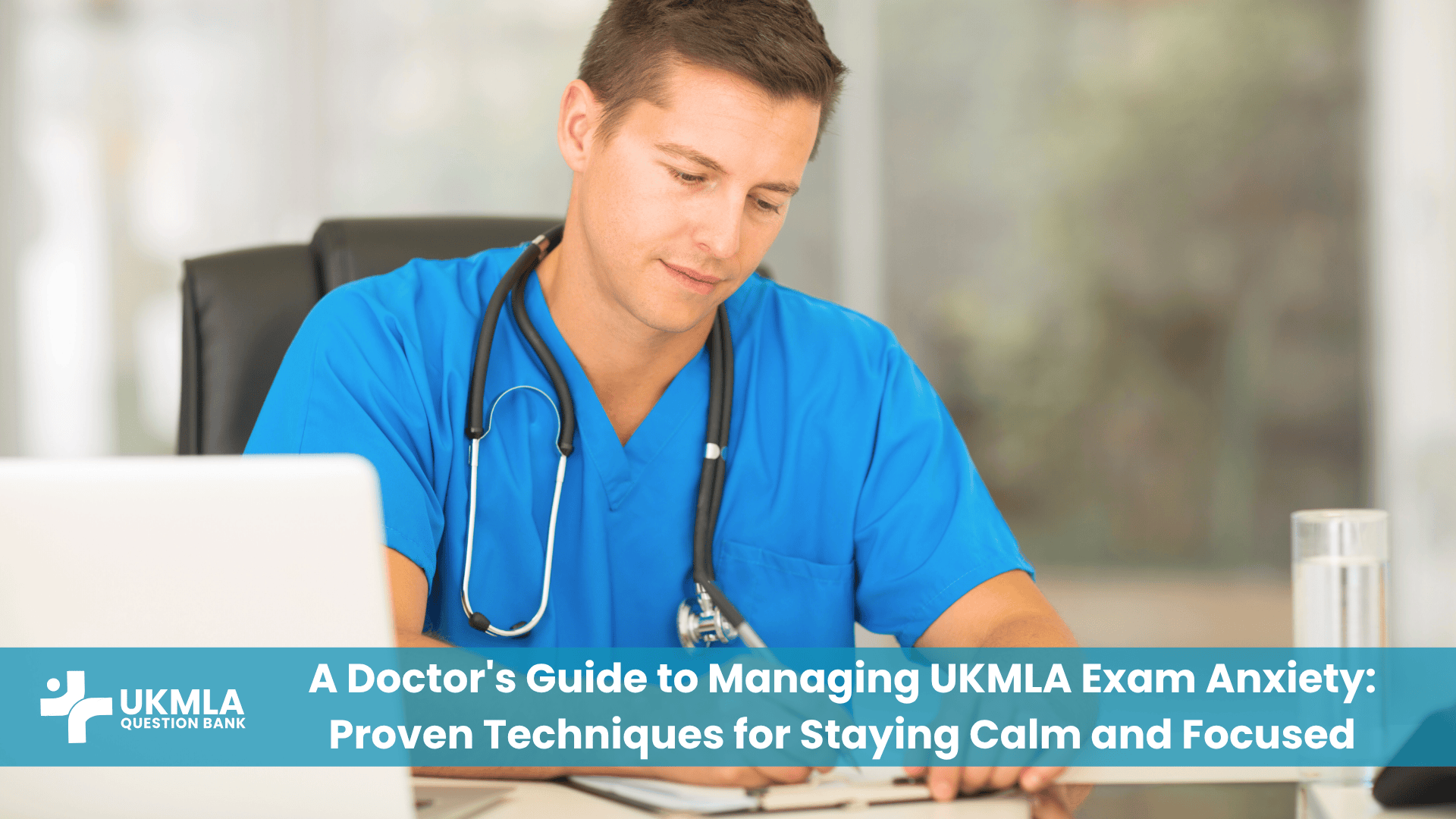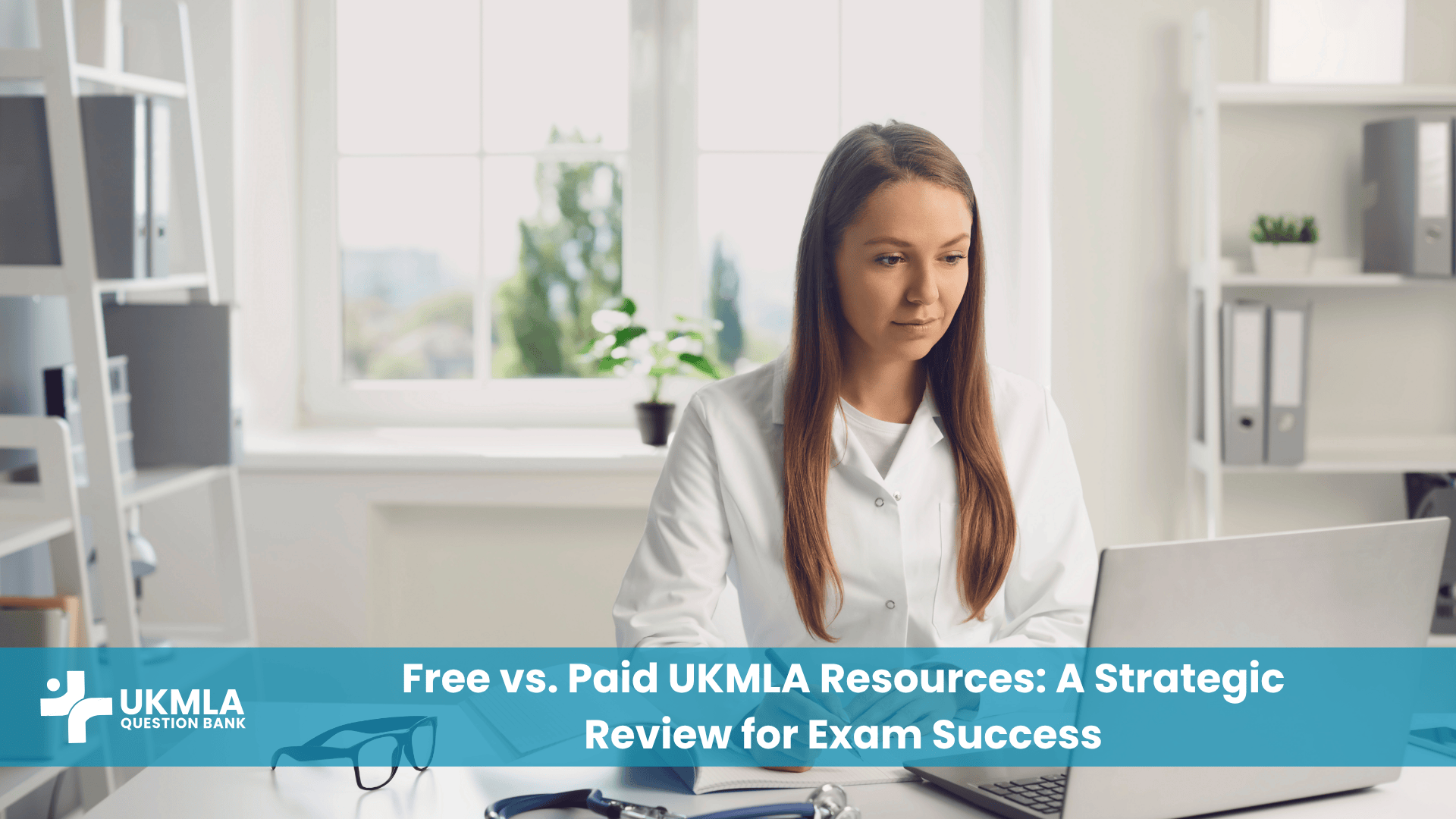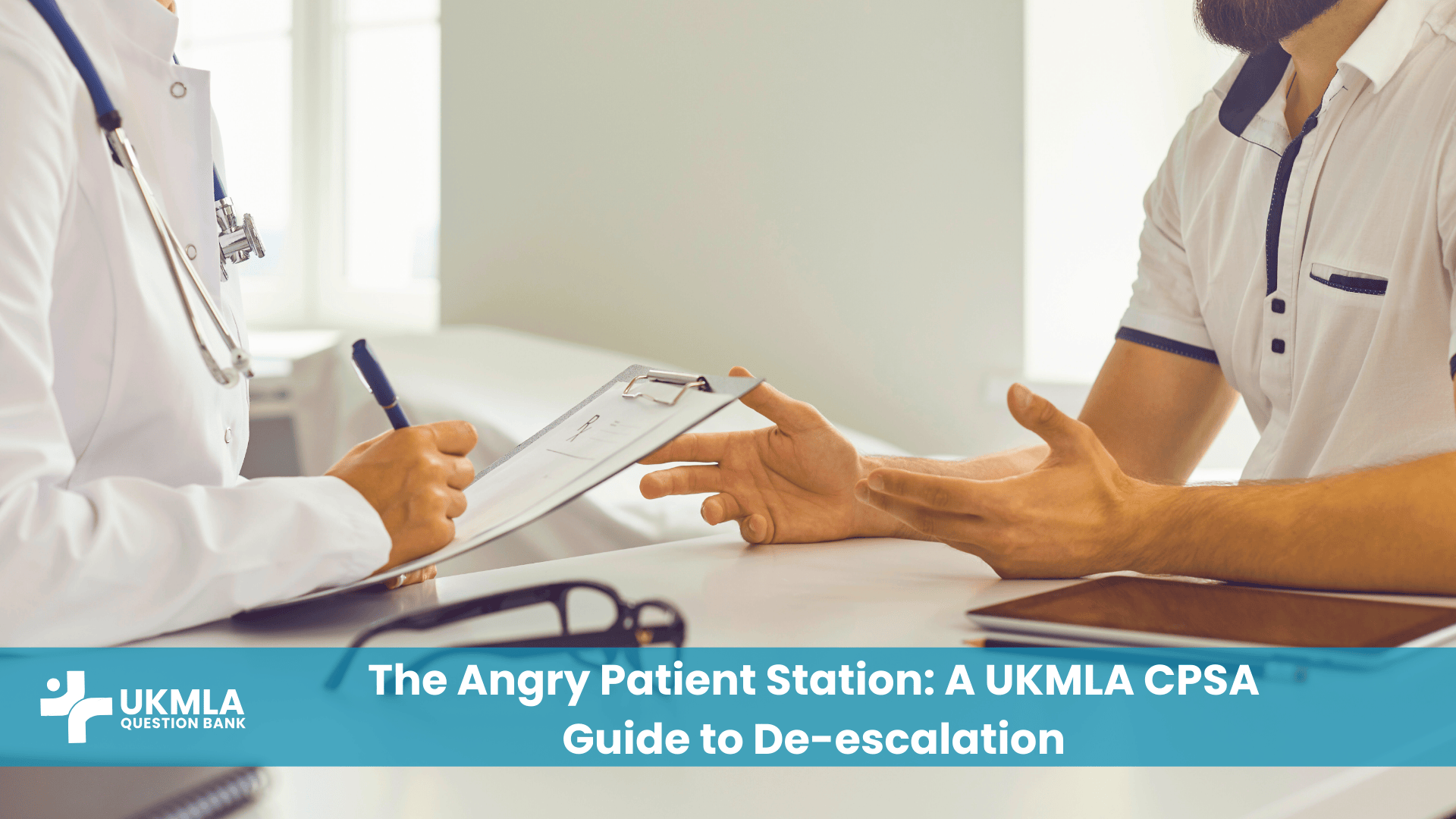Introduction
Learning how to manage UKMLA exam anxiety is a non-negotiable skill for any candidate serious about success. The immense pressure of this high-stakes exam can create a level of stress that goes beyond simple nervousness, potentially undermining years of hard work and clinical learning. It’s a common experience for bright, well-prepared students to underperform not due to a lack of knowledge, but because anxiety impairs their cognitive function on the day.
This guide is designed to be your practical toolkit for understanding and controlling exam anxiety. We will explore the psychology and physiology of stress, and provide a comprehensive set of cognitive, behavioural, and lifestyle-based techniques to help you stay calm and focused. By treating your mental preparation with the same rigor as your clinical revision, you can ensure that on exam day, you are able to perform at your absolute peak.
Table of Contents
ToggleUnderstanding UKMLA Exam Anxiety: The Mind-Body Connection
The first step to managing anxiety is to understand what it is and how it affects you. It’s not just “in your head”; it’s a powerful physiological and psychological response that can be managed once you understand the mechanism.
The Psychology of High-Stakes Test Anxiety
Test anxiety is a form of performance anxiety. It’s often rooted in a fear of failure and the perceived consequences of that failure. For the UKMLA, the stakes feel incredibly high, which can trigger unhelpful thought patterns like “catastrophizing” (e.g., “If I don’t pass, my career is over”) or “all-or-nothing thinking” (e.g., “If I can’t answer this question, I’m a complete failure”). These cognitive distortions fuel the emotional and physical feelings of anxiety. A key companion to this guide is our article on developing a positive mindset for UKMLA success.
The Physiology: How Stress Affects Performance (The Yerkes-Dodson Law)
The Yerkes-Dodson Law is a key psychological principle that describes the relationship between arousal (stress) and performance. It states that performance increases with arousal, but only up to a certain point. A little bit of stress can be motivating and sharpen your focus. However, once arousal becomes excessive, performance plummets. The goal is not to eliminate stress entirely, but to keep it in the optimal zone. When anxiety becomes overwhelming, the physiological stress response (the release of adrenaline and cortisol) impairs the function of your prefrontal cortex, which is responsible for complex thought, reasoning, and memory recall—the very skills you need in the exam.
Cognitive Techniques: Retraining Your Thought Patterns
Since anxiety often begins with a thought, learning to control your thoughts is the most powerful intervention.
Cognitive Reframing: Challenging and Replacing Negative Thoughts
Cognitive reframing is the process of identifying unhelpful thoughts and actively challenging and replacing them with more realistic and helpful ones. When you find yourself thinking, “I’m going to forget everything,” pause and challenge it. Ask, “Is that really true? Have I forgotten everything in my mock exams?” Then, replace it with a more balanced thought: “I have prepared well, and while I may not know everything, I know enough to pass. I will focus on what I do know.”
Positive Visualisation: Mentally Rehearsing Success
Visualisation is a technique used by elite athletes and performers to reduce anxiety and improve performance. Take a few minutes each day to close your eyes and vividly imagine yourself on exam day. Picture the entire process going smoothly: you feel calm as you enter the hall, you read the questions carefully, you access your knowledge with ease, and you manage your time effectively. This mental rehearsal helps to create a sense of familiarity and reduces the fear of the unknown, making the actual event feel less intimidating.
Behavioural Strategies: Proactive Steps to Reduce Stress
Your actions and routines in the weeks leading up to the exam can dramatically influence your anxiety levels.
The Power of a Structured and Realistic Study Plan
Anxiety thrives on uncertainty. A detailed, structured study plan is a powerful antidote because it replaces the vague, overwhelming goal of “study for the UKMLA” with concrete, manageable daily tasks. A good 3-month UKMLA study plan template can provide the structure you need. When you know exactly what you need to do each day, you create a sense of control that significantly reduces anxiety. Ensure your plan is realistic and includes time for breaks and rest. The NHS offers excellent official guidance and support for students through their Student mental health hub, which is a valuable resource.
The Role of Mock Exams in Desensitization
One of the biggest triggers for anxiety is the fear of the unknown. Mock exams are the best way to demystify the exam experience. By repeatedly simulating exam conditions, you are gradually exposing yourself to the stressful environment in a controlled way. This process, known as desensitization, reduces the anxiety response over time. The first mock might be terrifying, but by the fifth, the process will feel much more familiar and manageable. This is one of the most essential tips for passing the UKMLA.
In-the-Moment Coping Mechanisms for Exam Day
Even with the best preparation, you will likely feel anxious on exam day. Having a toolkit of techniques you can use in the moment is crucial.
Key Principle: When you feel overwhelmed by anxious thoughts, the quickest way to regain control is to focus on your body and your breath.
Table 1: Quick Techniques for Managing Acute Anxiety
| Technique | How to Do It | When to Use It |
| 4-7-8 Breathing | Breathe in through your nose for 4 seconds, hold your breath for 7 seconds, and exhale slowly through your mouth for 8 seconds. Repeat 3-4 times. | Before the exam starts, or during a short break if you feel your heart racing. |
| Grounding (5-4-3-2-1) | Silently name: 5 things you can see, 4 things you can feel, 3 things you can hear, 2 things you can smell, and 1 thing you can taste. | If your mind is racing or you feel detached. It forces your brain into the present moment. |
| Progressive Muscle Relaxation | Tense a specific muscle group (e.g., your fist or shoulders) for 5 seconds, then release and notice the feeling of relaxation. | During the exam if you feel physical tension building in your neck or shoulders. |
Having these techniques prepared is a core part of a good UKMLA exam day checklist.
How to manage ukmla exam anxiety Through Lifestyle
Your baseline level of anxiety is heavily influenced by your physical health. A healthy lifestyle provides a strong foundation of resilience against stress.
The Critical Role of Sleep, Nutrition, and Exercise
Sleep: This is non-negotiable. Sleep is when your brain consolidates memory. Chronic sleep deprivation impairs cognitive function and significantly worsens anxiety. Aim for 7-8 hours of quality sleep per night.
Nutrition: Avoid sugary foods that cause energy crashes. Focus on a balanced diet with complex carbohydrates, protein, and healthy fats to maintain stable blood sugar and energy levels.
Exercise: Regular physical activity is one of the most effective anxiolytics available. Even a brisk 20-30 minute walk each day can significantly reduce stress hormones and improve your mood and focus.
Strategic Use of Caffeine and Avoiding Stimulants
While it can be tempting to rely on caffeine to power through long study sessions, be mindful of your intake. Excessive caffeine can mimic or worsen the physical symptoms of anxiety (e.g., palpitations, tremors) and interfere with sleep. Try to limit your intake, especially in the afternoon and evening.
Building Your Support System
Tackling exam anxiety alone is a mistake. A strong support system is a vital part of your preparation.
Leveraging Peer, Mentor, and Family Support
Talk to your peers; you will quickly find that you are not the only one feeling anxious. Sharing your experiences can be incredibly validating. Seek out a mentor or senior colleague who has successfully navigated the exam process for advice and perspective. Be open with your family and friends. Let them know you’re going through a stressful period and tell them what you need, whether it’s encouragement, practical help, or simply space to study.
Knowing When and How to Seek Professional Help
If your anxiety is severe, persistent, and significantly impacting your ability to function or prepare, it is essential to seek professional help. This is not a sign of weakness; it’s a sign of strength and self-awareness. Your university or a GP can connect you with counselling services. Leading UK charities like MIND offer fantastic resources on anxiety and coping techniques.
Frequently Asked Questions (FAQ) about UKMLA Exam Anxiety
While distressing, it is not uncommon. See it as a valuable learning experience. It happened in a safe environment, and you can now analyze the triggers and prepare your coping strategies (like the 4-7-8 breathing) so you are ready if you feel that way in the real exam.
Don’t panic. This is a common anxiety response. Take a deep breath using one of your techniques. Flag the question and move on to an easier one. Answering a few questions you know will help rebuild your confidence. You can then return to the flagged question later with a clearer mind.
Yes, for many people, the physiological effects of caffeine (increased heart rate, jitteriness) are very similar to the symptoms of anxiety, which can trick your brain into feeling more anxious than it otherwise would.
Remind yourself that you are only seeing their “highlight reel.” Everyone struggles. Comparison is the thief of joy and focus. Mute study-related social media if you need to and focus entirely on your own preparation and progress.
Do not cram. Your goal is to get your mind and body into the best possible state for performance. Do some light review of summary notes if you must, but stop all studying by the early evening. Eat a good meal, prepare your bag for the next day, and do something relaxing to switch off your brain before getting a good night’s sleep.
Before you enter the station, take a few deep breaths. In the reading time, quickly structure your approach using a familiar framework. If you get flustered, it’s okay to pause for a second, take a breath, and say, “I’d just like to take a moment to think that through.” It shows maturity and control.
Absolutely. Sleep deprivation has been shown to have a similar effect on cognitive performance as being intoxicated. A good night’s sleep is one of the highest-yield revision activities you can do the night before the exam.
The 5-4-3-2-1 technique is excellent. Silently name 5 things you can see, 4 things you can physically feel (your chair, your pen), 3 things you can hear, 2 things you can smell, and 1 thing you can taste. This pulls your mind out of the anxious spiral and back into the present moment.
Yes, talking about it with trusted friends, family, or a mentor can be very helpful. It normalizes the experience and allows them to support you. Keeping it bottled up often makes the feeling worse.
You have prepared for this. You have the knowledge and the skills. Your job on the day is not to learn more, but to calmly and systematically show the examiners what you already know.
Conclusion
Managing exam anxiety is not about finding a magic bullet to eliminate stress; it’s about building a toolkit of reliable techniques that give you a sense of control. By understanding the interplay between your thoughts and your body’s stress response, you can begin to intervene effectively. Proactive behavioural strategies, such as creating a solid study plan and using mock exams for desensitization, build a strong foundation of confidence.
On exam day, your in-the-moment coping mechanisms will be your best friend, allowing you to stay grounded and focused when the pressure is at its peak. Remember that learning how to manage UKMLA exam anxiety is a crucial part of your preparation. By investing in these skills, you are not only maximizing your chances of success but also developing the resilience and self-awareness that will be invaluable throughout your medical career.




